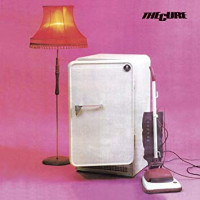I’ve written before about the very vague definition of post-punk, which is basically just music inspired by punk that isn’t punk. The Cure’s style would really expand the genre of post-punk over the course of their career, but for their 1979 debut, Three Imaginary Boys, The Cure’s sound was much closer to punk than The Cure ever would be again. The style of Three Imaginary Boys has the chord-based simplicity of punk with similar tempos, but features much less distortion and staccato on the guitars. Cure frontman Robert Smith was famously displeased with the album, calling the album “lightweight” and shallow and subsequent albums would show a significantly different sound because of that. Smith was also upset with the fact that that the record label chose the order of the tracks as well as the cover art.
While Robert Smith quickly retreated from the style of Three Imaginary Boys, his distaste with the album is unfounded. Three Imaginary Boys is an excellent example of the kind of sound you can pull from punk without playing punk outright. The album is foreboding, dark, and scary, as witnessed by the ending of “Subway Song” where the song slowly descends into silence and then, after a brief pause, a loud scream pierces through the eerie silence to nearly give you a heart attack. The darkness of the album often relates to terror from the urban landscape, cities of monsters coming to eat you. The fact that the label chose a bright pink album cover ironically belies the depth of darkness throughout the album.
The album opener, “10:15 Saturday Night,” is a cold song of isolation and longing that comes off sounding like a sort of proto-gothic rockabilly tune. “Grinding Halt” is a fun little pop song and, while the song’s tone is pretty upbeat, the lyrics depict the chaos and crowdedness of a big city. The cover of Jimi Hendrix’s “Foxy Lady”—sung by bassist Michael Dempsey making it, as far as I can think of, the only Cure song not sung by Robert Smith—was entirely a label decision that the band didn’t agree with, and you can see why because it sounds so out of place on this album. “Fire in Cairo” has some of Smith’s best lyrics of the early era of The Cure, despite having virtually no plot. The lyrics are pure imagery and mostly seem to just exist to evoke gorgeous imagery, which I’m frankly very okay with. The title track, a slow, melancholy tune, sums up the album’s themes of loneliness in crowded cities in the most perfectly bittersweet way.
Three Imaginary Boys was not originally released in North America and Australia, so in 1980 eight of the tracks were reworked into a new album with a different track order and a few different songs called Boys Don’t Cry, the title track of which went on to become one of the band’s most classic songs. In fact, “Boys Don’t Cry” is essentially the only song from this early era of The Cure that they still play live. The Cure were quick to move on to different styles of music, with their 1980 release, Seventeen Seconds, already moving away from the style of Three Imaginary Boys in a big way. Their sound would go on to become more dense and lush and would define goth music and culture for years, even decades, to come. Still, Three Imaginary Boys remains a time capsule of a different era for The Cure when “post-punk” meant something totally different for them.
